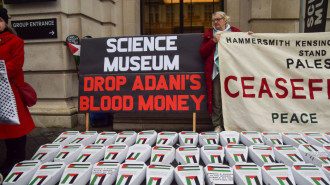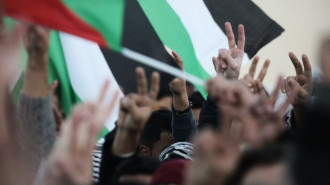
Arab armies turn to women: An illusion or a new reality?

In October 2019, Saudi Arabia allowed women to join the kingdom's armed forces but maintained a legal glass ceiling limiting them to subaltern positions. In parallel, the United Arab Emirates shone a spotlight on Mariam al Mansouri, the first Emirati woman fighter pilot, as she was leading a squadron conducting airstrikes in Syria against the Islamic State group (IS).
The integration of women into Arab armed forces remains uneven across countries, slow and fraught with obstacles, whether they be legal, religious, or societal. However, women are gradually entering the military institution, through proactive policies conducted by the States that have understood the strategic interest of integrating women into national defence.
"Many Arab countries, aware of the added value of women in national defence, have set up strategies and committees dedicated to the integration of women in military institutions"
If the rates tend to grow regionally, women represent still 5 percent of the total military workforce in Lebanon, 7 percent in Tunisia, and 1.5 percent of military personnel excluding medical services in Jordan, according to a study published in 2019 by the Lebanese American University.
A positive evolution
It is certain that the importance of the place of women in the army is far from obvious to many Arab citizens. In Egypt, Article 10 of the Egyptian Constitution guarantees gender equality, but Article 11, which proclaims the attachment to family, religious and patriotic values, has been used as a basis to paralyse progress in this area. To counter such an argument, many intellectuals have pointed out the absence of religious grounds for such a ban.
While activists’ pressure has played a role in the advances made in recent years, advances in the integration of women in the military forces have been driven primarily by operational needs. For instance, the Syrian army is massively integrating women into its combat units not only to fill a manpower gap (about 8,500 women joined the Syrian armed forces and allied militias between 2013 and 2016) but also for technical reasons.
Dalia Ghanem, a researcher for the Carnegie Middle East Research Center, reveals that, "In 2015, there were some 800 women in combat units, according to official figures, fighting in Assad's army. It was an elite brigade with snipers and tank operators."
The presence of women is also strategic for conducting body searches on civilians in conservative areas, which is why Saudi Arabia has allowed the recruitment of female border guards since 2013.
Moreover, this phenomenon is part of a global strategy to better integrate women into the workforce and combat religious extremism. Female soldiers have become the symbol of the fight against terrorism: their image contrasts with one of women enslaved in the territories controlled by IS, as part of real psychological warfare conducted against the organisation.
Thus, the integration of women into the armed forces carries profound stakes in terms of public communication for these States. These developments are accompanied by real communication campaigns, highlighting certain female figures or emblematic battalions to occult the persistence of military institutions dominated by men. These strategies are particularly useful for States with poor gender records, in attracting the sympathy of the international community.
Despite the apparent backwardness on the issue, the overall situation and mentalities are evolving towards more openness: according to a report published by Aswat Nisaa in 2018, 56 percent of Tunisians surveyed have a positive view of women's participation in the defence sector, while 60.6 percent of them believe that women have the same technical skills as men.
Jordan and Algeria, pioneers in the Arab world
In the last two decades, many initiatives have been implemented in Arab countries to increase the participation of women in the armed forces.
Algeria is a model country in this regard: the status of female soldiers is equal to that of men since 2006, and a national strategy has been designed to eliminate gender discrimination in the military sphere.
Women officers are entitled to three years' early retirement, maternity leave, and days off to care for their families in case of illness or accident. Finally, they are exempt from night duty. As a result, they represent 18 percent of the students at the Cadet Academy and 31.5 percent of the officer candidates at the Naval Academy of the country. The measures cited above aim to reconcile employment in the military with the traditional role of women in the household.
Similarly, in Jordan, women benefit from three months of parental leave and two years of unpaid leave for personal reasons. They are supported through a specific national strategy (JONAP), enforced by the Directorate of Military Women's Affairs (DMWA), which works to promote the role of women in the Jordanian army and conducts studies. The strategy set a target of 3 percent female military personnel in the Jordanian army outside the medical sphere.
"While activists’ pressure has played a role in the advances made in recent years, advances in the integration of women in the military forces have been driven primarily by operational needs"
According to Dalia Ghanem, "Many Arab countries made encouraging efforts these past twenty years. Jordan has been a champion in integrating women in its army, and the efforts made are considerable.”
Jordan launched a partnership with UN Women in September 2021 to increase the presence of women in military leadership positions and their participation in peacekeeping operations. The Secretary-General of the Jordanian National Commission for Women (JNCW), Dr Salma Nims, commented on this partnership by calling the Jordanian Armed Forces, "One of the leading national institutions that actively invested in gender mainstreaming, gender equality, and in fostering a conducive working environment for women to support their meaningful participation."
A structural glass ceiling remains
Despite the strong institutional interest shown by many countries, the barriers to the entry of women into military institution remain numerous. Although they are present in the active forces, they remain few in leadership positions.
Algeria, which witnessed the appointment of the first Arab female general, has currently only five of them in its armed forces. This is also the case in other Arab countries, in which a glass ceiling prevents women from having access to high-rank positions and influencing decision-making.
Most women in the military are excluded from combat units such as infantry, artillery, or armour. They are still limited to support roles, particularly in the medical and administrative fields.
Women in military institution suffer from a lack of infrastructure and equipment, as well as sexual harassment generated by a patriarchal culture that makes the army a sanctuary of hyper-masculinity. In most countries, the gender-based division of labour is maintained, as women are often perceived as not able to adapt to the discipline and rigour of military life and combat.
In Tunisia and Morocco, public debates have been held about the possibility to achieve total parity in the military field and imposing military service on women. Such an upheaval can be the source of a transformation of the Arab armed forces, but also of a significant gain inefficiency.
Many Arab countries, aware of the added value of women in national defence, have set up strategies and committees dedicated to the integration of women in military institutions.
"Today, there is more cooperation between Arab armies than a decade ago in terms of women's integrating their armies," says Dalia Ghanem, which gives hope for possible regional cooperation in the future.
Sami Erchoff is a freelance journalist based in Beirut
![Female soldiers of the Jordanian People's Army stand in line, rifles in hand, during training [Getty Images]](/sites/default/files/styles/medium_16_9/public/2021-11/GettyImages-542365186.jpg?h=a7e7c04b&itok=OuU-Zb_B)


